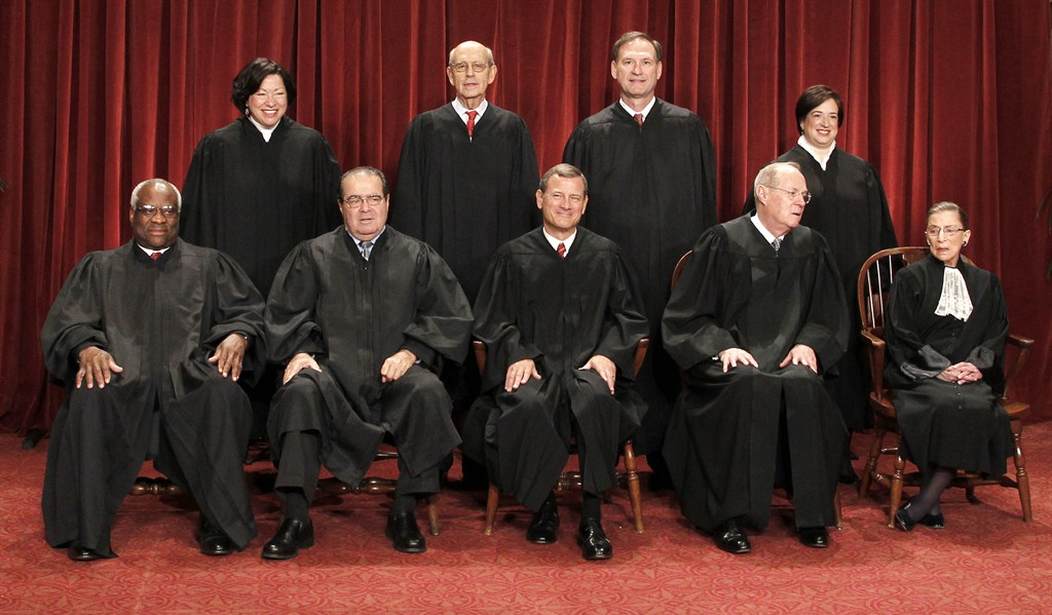Luckily, the Supreme Court isn't governed by public opinion–and it shouldn’t. Yet, this issue about trust from a new CNN poll has resurrected (or should resurrect) Justice Elena Kagan’s refusal to recuse herself from Obamacare cases. By the way, this isn’t partisan bickering, as calls for her recusal have also come from both ends of the political spectrum. First, let’s breakdown the CNN/ORC poll on the judicial branch. Two of the biggest issues facing the Court revolve around gay marriage and Obamacare. The sample was a random selection of 1,025 adults nationwide (via CNN):
With major Supreme Court decisions on health care and same-sex marriage expected this month, many lack trust in the Supreme Court's handling of those two issues, according to a new CNN/ORC poll.Yet most approve of the way the court is handling its job generally.
A majority, 52%, say they approve of the way the court is handling its job, while 41% disapprove. That's an improvement from an even 48% to 48% split two years ago. Still, when Americans are asked how much they trust the court on a range of issues it will be considering this term or the next, the worst ratings come on health care and same-sex marriage. Only about half say they have at least a moderate amount of trust in the court on health care (50%) or same-sex marriage (49%). There is more faith in the Supreme Court on other key issues on the docket, with most saying they trust the court at least a moderate amount on freedom of speech (69%), voting rights (65%) and the death penalty (60%).
…
Supreme Court cases on same-sex marriage and the 2010 health care overhaul have been among the court's most high-profile rulings in recent years, and opinions on those two issues divide views on the Supreme Court generally. Those who believe that same-sex couples have a constitutional right to marry largely approve of the court's work, 60% approve while 35% disapprove, and those who say there is no such right mostly disapprove, 54% disapprove while 38% approve. Likewise, 61% of those who favor the 2010 health law approve of the way the court is handling its job, 33% disapprove. Among those opposed to the law, views are closely divided: 45% approve and 48% disapprove.
Likewise, Democrats, who are more apt to favor both same-sex marriage and the health care law, are more likely than Republicans to approve of the court's work. Sixty percent of Democrats approve compared with 40% of Republicans. Independents tilt positive, 52% approve while 41% disapprove. By ideology, moderates actually give the court its best marks, 60% approve, compared with 53% of liberals and 41% of conservatives.
The issue divide carries through when Americans on both sides of the same-sex marriage and health care debates are asked how much they trust the court to handle each issue. On same sex marriage, 63% of those who see a constitutional right for gay or lesbian couples to marry say they trust the court at least a moderate amount on same-sex marriage. Among those who do not see such a right, just 25% have that much trust in the court. On health care, 64% who favor the law trust the court to handle health care policy, only 39% who are opposed to the 2010 law agree.
Recommended
Keep in mind, the poll still showed that Obamacare is still unpopular overall, with 43 percent of Americans support the Affordable Care Act, while 55 percent oppose it; 11 percent said the bill cannot be called a success; 35 percent said it’s been a failure; and 53 percent have a ‘wait and see’ attitude towards the law. This comes as the Court prepares to rule on whether the IRS can extend health care subsidies to those in states where Obamacare exchanges have not been set up.
The reason conservatives are down on the Court is certainly grounded in the disappointing National Federation of Independent Business v. Sebelius ruling in 2012, where the majority ruled that the individual mandate was constitutional since it operated as a tax; Congress has taxing authority. It was a punch to the gut for the right, animated the left ahead of the 2012 elections, and–barring a Romney defeat–would be the last time conservatives could gut the law before millions of Americans would enroll and complicate the narrative in future elections; does anyone want to be the party runs on a platform aimed at taking people’s stuff away? It’s certainly not a winning strategy, especially for Republicans who haven’t proven to be adept at messaging.
Yet, regarding trust, it’s a bit weird that Justice Kagan is hearing arguments on a law where she played a role regarding legal strategy. Liz Mair, a GOP consultant who works on judicial reform issues–and has taken issue with Justice Kagan’s refusal to step away from anything Obamacare-related–told Townhall, “Obamacare cases coming in front of the Supreme Court is not a phenomenon that is likely to stop anytime soon.”
“However, Justice Kagan's pattern of hearing them and weighing in on them despite obvious conflicts is one that should end if the Court wants to prevent further erosion of the public's trust in it where health care policy is concerned,” she added.
Let’s rehash those conflicts of interest the sitting justice has regarding Obamacare. In 2012, Sen. Jeff Sessions (R-AL) made it abundantly clear the ethical conflicts Kagan had before NFIB v. Sebelius’ oral arguments (via NRO):
As solicitor general of the United States, Justice Elena Kagan served as the head of an office responsible for formulating the Obama administration’s legal defense of its domestic agenda priority — Obamacare. It could be no surprise to President Obama who appointed her to the Supreme Court that any former solicitor general would have many conflicts for years to come. Now, the Court will soon hear a constitutional challenge to the health-care law. Despite mounting evidence of her substantial participation in the administration’s legal defense of that law, she still has not announced whether she will recuse herself from presiding over the case as a justice.According to Section 455(b)(3) of Title 28 of the U.S. Code, justices must disqualify themselves in cases where they have “served in governmental employment and in such capacity participated as counsel, adviser, or material witness concerning the proceeding or expressed an opinion concerning the merits of the particular case or controversy.” In United States v. Gipson, the Tenth Circuit held that judges must recuse themselves if they have “previously taken a part, albeit small, in the investigation, preparation, or prosecution of a case.” Other courts have suggested that, merely by virtue of a lawyer’s position as the head of an office during the preparation of a case, he or she is disqualified to sit as a judge on that case. For example, several U.S. Circuit Courts of Appeal have held that U.S. attorneys who later become judges must recuse themselves from any proceeding that had been pending in any way in their offices, even if they were not substantively involved.
Yes, Sessions is a hard-core conservative, but even liberal constitutional law professors, like Eric Segall, wrote in December of 2011 on Slate–a Washington Post-affiliated site–that Kagan should recuse herself from the proceedings. He also cited Justice Scalia recusing himself on cases for reasons that amounted to much less regarding the ethical questions surrounding Kagan and the ACA. Segall reiterated some of Sessions’ points as well:
First the law: A federal statute requires that any “justice, judge, or magistrate judge of the United States shall disqualify himself in any proceeding in which his impartiality might reasonably be questioned.” Federal law also requires that a judge recuse herself if the judge previously served in governmental employment “and in that capacity participated as a ... counsel, adviser, or material witness concerning the proceeding or has expressed an opinion concerning the merits of the particular case in controversy.”…
A few years ago, Justice Scalia recused himself from a case challenging the constitutionality of the “under God” provision of the Pledge of Allegiance because he made a few for offhand comments about the case during a speech. Most liberals approved of Scalia’s decision at the time. The case for Kagan’s recusal, while different, seems even stronger to me. Scalia recused himself because he preliminarily aligned himself with a view of the case while it was pending. But Kagan was politically aligned with the president who is identified with the law at issue. She was aligned with him when the law was passed, and that president—and his administration’s—future may be severely impacted by the court’s ruling on the ACA. Scalia’s problem in the Pledge case was limited to what he said. Kagan’s problem with the ACA lies in what she did.
…
- She served as the solicitor general of the United States during the time that the ACA was furiously debated in Congress, discussed in town halls across the country, and enacted;
- The ACA is the most important, controversial, and partisan piece of legislation put forward by the Obama administration while Kagan worked as the president’s top lawyer to the Supreme Court. If he didn’t consult with her about it, he should have;
- She was nominated to the Supreme Court by President Obama shortly after the ACA was passed, and the president is closely and personally identified with the law;
- She has to review the law just a few months before President Obama runs for re-election;
- His re-election might well be affected by how the Supreme Court rules; and
- We know she celebrated the passage of the law.
…
Opponents of my argument for Kagan’s recusal might contend that other justices, like Jackson, Warren, Blackmun, and Souter greatly disappointed the presidents who appointed them on important issues of national defense, civil rights, and abortion, and Kagan could possibly do the same on the validity of the ACA. But none of those justices worked for the appointing president during the same term the president's signal piece of legislation was passed, and shortly before the president was running for re-election. Back in the days after the Civil War, President Grant openly stacked the court to reverse an important decision he did not like invalidating Congress’ authority to issue paper money. But that law was passed long before Grant was elected president and, in any event, that incident caused great damage to the public perception of the court.
And, that, it seems to me, is the bottom line. The Supreme Court is increasingly seen as a partisan political institution making political decisions instead of a true court deciding cases under the law. Justice Kagan has a golden moment to display that at least one Supreme Court justice has integrity and character that exceed her party loyalty and political past.
She obviously ignored that rallying cry. So, if were going to talk about trust in the Court–and preventing the horrible optics of it being looked upon as a political tool of the sitting administration–maybe Kagan should abide by the standard Segall and Sessions outlined. I’m sure there are other instances of conflicts of interests with past and present Supreme Court Justices; Justice Clarence Thomas has been the source of such accusations from the left. Yet, with regard to Obamacare, Kagan’s issues look quite explicit.























Join the conversation as a VIP Member